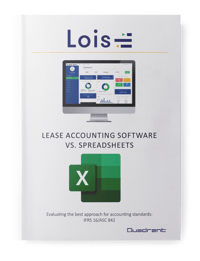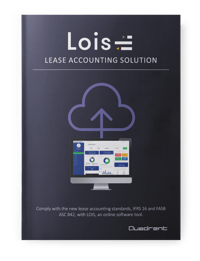We recently participated in a CPA Australia hosted webinar with Deloitte that focused on the importance of ensuring your IBR is up-to-date and correct, especially for modifications. This helps to avoid any IFRS 16 compliance issues or balance sheet inaccuracies at year end and keeps your auditors happy.
You can view the recording here (Password: CPAAustralia2021) and download the slides here.
Below are the answers to the questions we received at the end of the webinar. If you need any further clarification, please don't hesitate to contact CFO, Stefan Iggo at stefan.iggo@quadrent.co.nz.
Is a rent review deemed to be a lease modification?
It depends. Under the new COVID accounting rules, there are new exemptions which could make it exempt from being a modification depending on the detail of the contract. Deloitte has some good material on the ins and outs of it. Basically, it is a decision tree based on the contract to see if you can get a rent release under the new COVID accounting exemptions.
Read more information about this from Deloitte here.
Will the impact of NZ IAS 36 'Impairment' be similar to assets under IFRS 16 as any other non-current assets bought outright under NZ IAS 16? Will the IBR be affected due to impairment?
Impairment is a separate assessment to the two. Practically, the economic circumstances of the impairment and the IFRS 16 treatment are integrated.
The IBR would be impacted if your perceived credit quality and balance sheet are impacted. So, if your ratios such as your gearing ratios or any of those key financial ratios are impacted there is a potential for your IBR to be impacted. The other thing to bear in mind is that for a lease that never changes, the IBR is set and forget, you have these events that happen afterwards so the IBR may not be impacted.
With such a detailed question reviewing the complete fact pattern is key.
What happens when the lessor gives a discount or rebates on the lease payments due to this COVID-19 impact. How does it affect the lease modifications and effective dates?
Before COVID accounting if you were to get that it would have been a modification. Basically, the contractual obligation of the lease has changed.
With COVID accounting, it allows you the option to take that modification from the lease depending on if it is contractual or not, and take it to the P&L rather than the liability and the asset. Again, you have a couple of options, you can do it as a modification which will affect the asset and the liability, or you can take it through the P&L.
Read more information about this from Deloitte here.
Can you suggest any IFRS 16 SaaS packages that are worth looking at?
There are a number in the market, the one discussed in the webinar is LOIS, which you can find more about here. There are also various managed service offerings from the Big 4.
An article on packages is outlined here.

What is your experience with govt. entities as they are not affected with commercial impacts?
In Australia, IFRS 16 was adopted by the government. The difference was that the transition and the IBR was mandated by the different states. So, they very much see it as accounting compliance only.
In New Zealand, it’s under IPSA 13, which is not finalised yet, but is likely to go to a IFRS 16 equivalent in January 2022. The XRB is still working through the process and the Government have been quiet on it, but the expectation is that IFRS 16 will be reflected in the public standard.
If there is a CPI clause for an annual rent review in the lease agreement is this a lease modification?
Yes, as the consideration paid is changing and the amount it changes by is only known once the CPI assessment is made.
Are there any loopholes in IFRS 16 that can be exploited by companies?
Like any standard there are grey areas. As a lessor you can potentially engineer contracting to have leases on or off-balance sheet.
Obviously, the main example is to take the low value exemption. There is a misnomer that the low value exemption is USD 5000, but it can be any amount that is reasonable. In some circles it could be less than a car.
We are also seeing the rise of managed services. With some clever contracting you can have a managed service which is a lease in disguise to not have it on balance sheet.
Also, on the premise of this webinar, as you can see from changing your IBR rates you can change the look and feel of your balance sheet.
Something like an IBR, and therefore the value of the lease that you bring onto the balance sheet, is a range. The important thing as an organisation is where do you want to be in than acceptable range, and that is where you want to focus your efforts.
Read more information about this here.
What's the best approach to treat lease property rent free periods?
It depends on the outcome you want. From an ease-of-use process, I would treat it as a modification and do a consideration price change, and reflect that in the asset and liability, especially if you have a SaaS system, as it’s just done. If you are using spreadsheets, it’s a bit harder, so you’d just take it to the P&L.
More resources to read
 |
 |
| Spreadsheets vs. Lease Accounting Software - Evaluating the best approach |
All you need to know about LOIS, our lease accounting solution |
 |
 |